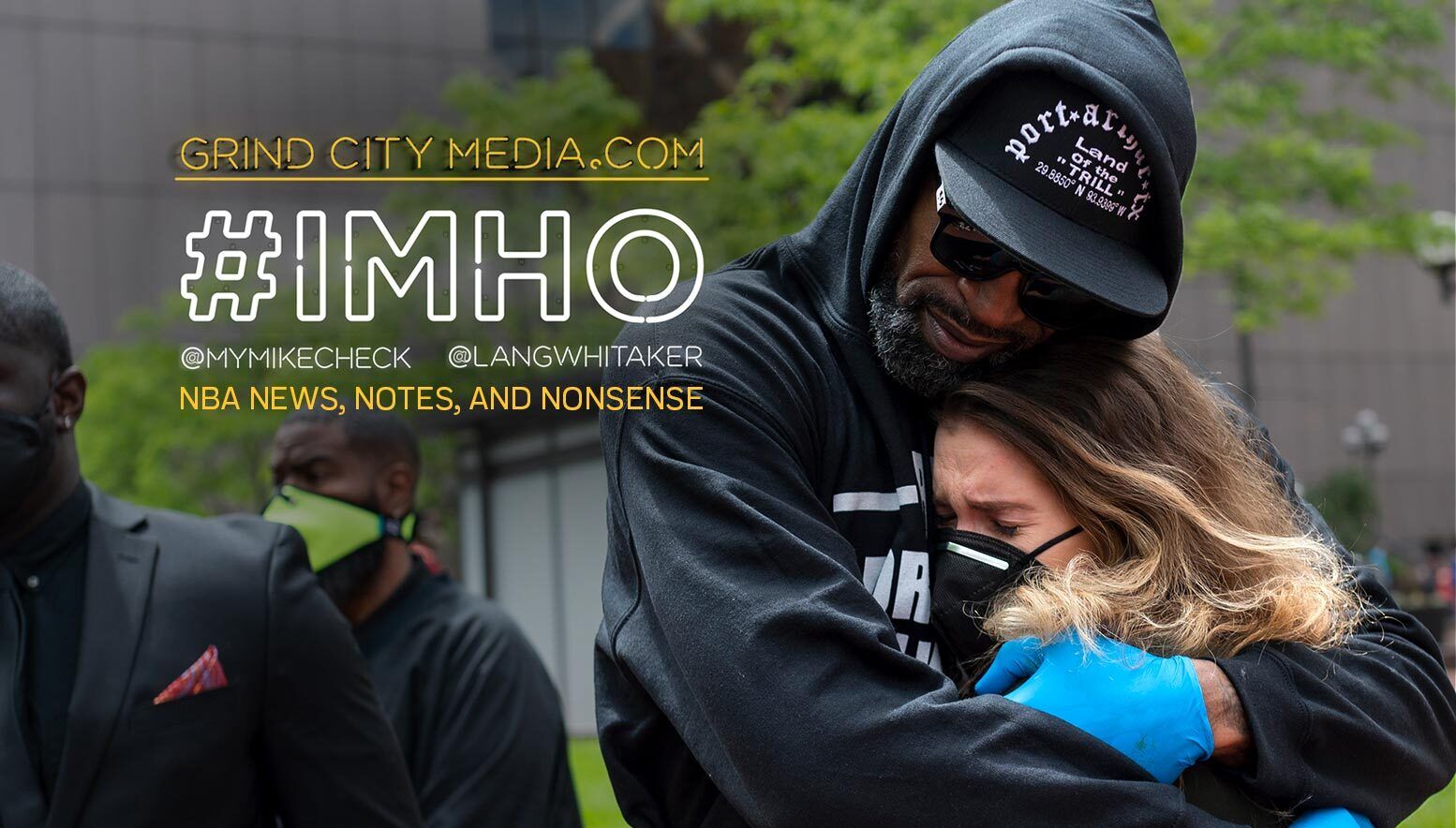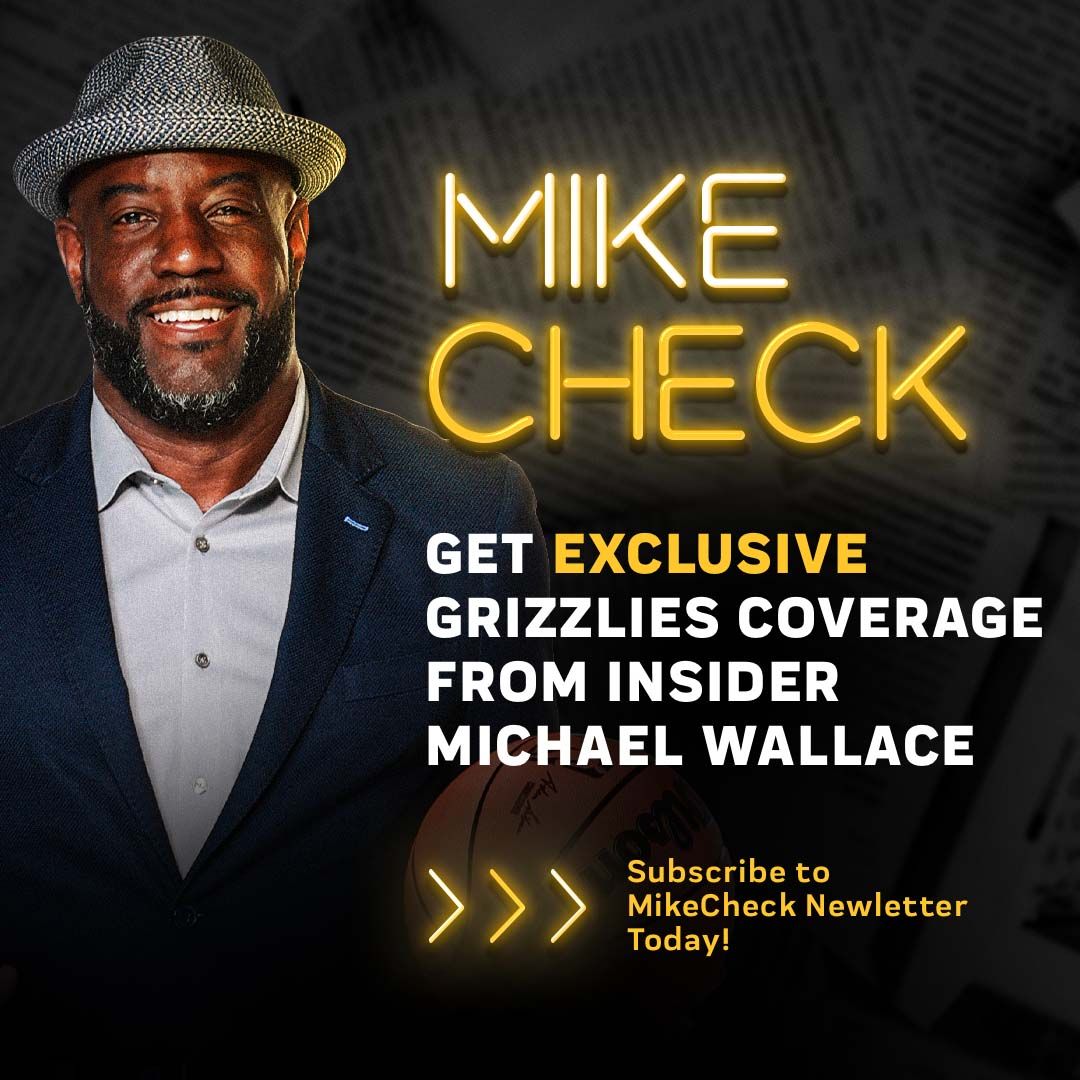
#IMHO: A Deeper Conversation
Lang WhitakerGrind City Media’s Lang Whitaker and Michael Wallace have been covering the NBA since shorts were short and socks were long, but their opinions about the League don’t always mesh. #IMHO is their weekly chance to weigh in on the most pertinent news from around the NBA. What’s lit? What’s lame? Find out each week right here.
From: Lang Whitaker
Date: Tuesday, June 2, 2020 at 7:55 PM
To: Michael Wallace
Subject: IMHO
Mike:
How in the world do we start this week’s IMHO? Sports, along with everything else, have taken a backseat this week to discussions around civil rights and justice. Discussions about the murders of George Floyd and Ahmaud Arbery and Breonna Taylor, and the protests that have sprung up in their wakes, and the Black Lives Matter movement and violent police presences at the protests and… well, there’s a lot going on right now.
Over the weekend my wife said to me, “You should say something.”
“What?” I asked. “What do you think I should say?”
“There are many people hurting,” she responded. “You could at least show some support on social media or say you support… you have to say something.”
Do I have to say something, I wondered? For most of my career, I’ve tried really hard to keep my political and personal beliefs my own. For literally decades now, I’ve avoided wading into arguments about politics and religion and everything else that people argue about, ad nauseum, online. Because to me, all that noise doesn’t help anything. My feelings are my feelings, I’ve always believed, and you can have your feelings, even if I don’t agree with you.
At the same time, I’ve tried to set an example. By treating people the same, regardless of the color of their skin or what they believe. By following the golden rule. By valuing diversity and inclusion. By being kind. By listening.
And I thought maybe doing all of that stuff was enough.
As it turns out, maybe it wasn’t.
I do have to say something. Mike, that’s been my biggest personal takeaway from the last week: I can do more; I can say more; I can listen more; I can donate more time and money to help more people do more. After all, what good is having a platform if I don’t use it?
Like I said at the start, I’m not sure where to even begin this week’s IMHO. We could talk about how we got here, I suppose, but I think right now I’d love to hear how you’re feeling, and I’d love to listen to your thoughts on where we are right now.
I’m not sure where we’re going next. But I know we have to do it together.
From: Michael Wallace
Sent: Wednesday, June 3, 2020 at 9:09 AM
To: Lang Whitaker
Subject: Re: IMHO
Pain. Frustration. Anger. Fury. Rage. Hope. Eager. Outrage. Determination.
Lang, my mental/emotional playlist has been on repeat for some time now, relentlessly cycling between enraged and encouraged. I was heading into my senior year in high school when I witnessed images of what amounted to a police mob graphically beat Rodney King to within inches of death on camera after a traffic stop in 1992. I thought that would be the worst thing I would ever see play out in front of my eyes on national TV for the rest of my life.
I was wrong. Very much so.
Nearly 30 years later, I’m a grown man now with kids who are young adults in this country. And as we processed the absolutely horrible footage of George Floyd handcuffed, face down in the middle of an American street, taking his last breaths under the weight of an emotionless, merciless police officer kneeling on his neck, I struggled to catch my breath, too. And without me even knowing, tears had streamed down my face. And my mind tried to contemplate the rhetorical question racing through my head.
What’s changed in nearly 30 years as it relates to police brutality, particularly in black America? Other than technical advancements of high-def video and camera phones now capturing Floyd’s death compared to the grainy quality that recorded Rodney King’s. What’s changed, other than the bolder audacity of cops who looked directly into the camera as they executed a murder in broad daylight compared to a mob that figured it was carrying out its brutality under a relative cover of darkness?
I’m old enough now to understand how 30 years can pass, yet at the same time it can feel like very little progress has been made in critical areas. I entered adulthood in the 1990s being constantly reminded by my grandparents of what they endured in the 1960s and before. And I’m having those same conversations of historical context with my kids as it relates to these ugly incidents.
So yeah, you’re right. The question is where do we go from here? As a black man, I still have hope for this country and this world. But I’ve always braced myself for having to live a different reality in the face of that hope.

From: Lang Whitaker
Date: Wednesday, June 3, 2020 at 3:35 PM
To: Michael Wallace
Subject: Re: IMHO
To me there’s no question that our hope and reality have had a major disconnect, for as long as I can remember. I grew up in Atlanta, a few miles from Dr. King’s home, and even being raised in the shadow of his legacy, it was clear that the world many of us longed for just didn’t exist, and there are times it seems like it may never come about, as people actively work to prevent that from happening.
And like you, I’ve also thought a lot recently about the other King, Rodney, and the press conference where he asked, “Can’t we all just get along?” It was a simple question, but it still resonates. There are some days where I sit here and wonder, why can’t we all just get along? Why can’t we love our neighbors as ourselves? Is that too much to ask?
Yet even as depressing and frustrating and sad and sickening and confusing as these last few days have been, like you, I’m choosing hope. And I’m pledging to do my best to pass that hope along. My son is 7 years old. I just want him to believe that there is goodness out there in the world, that Dr. King’s dream is something that we can, one day, achieve.
I know there are some people who will never change, but that doesn’t mean we have to give up. We can vote, we can volunteer, we can make a difference. Can’t we?

From: Michael Wallace
Sent: Wednesday, June 3, 2020 at 5:00 PM
To: Lang Whitaker
Subject: Re: IMHO
Yes, indeed, we can. And we can also start by simply being a compassionate and considerate listener to others. Eventually, we can agree to even disagree. But we can all be better listeners. We can try to become better learners. Ignorance and Intolerance are conditions. They don’t have to be fatal diseases.
Lang, I’ve seen so many franchises, companies and corporations – large and small – issue powerful statements denouncing racism, police brutality and violence in the face of all we’ve been dealing with recently. And we both agree those are significant first steps. But there’s also the need for definitive action and programs and initiatives that must come with those statements. I wasn’t really too much of a fan of the universal social media #blackout on Tuesday, because those collective actions on social media just don’t do much for me anymore. I need movement beyond these moments. I demand stances beyond statements. Maybe it’s asking too much. But it’s not asking too much to expect folks to view black Americans as human beings, just like anyone else.
Which brings me to this point as we close, Lang: The NBA is formalizing plans to return with a 22-team format that will start play July 31 in Orlando and include an eight-game resumption of the regular season leading into a potential play-in round before the playoffs. We have plenty of time to dig further into the details and the matchups and so much more in the coming weeks. But for now, there’s a more pressing matter on my mind as it relates to this return.
The NBA, in full-scale fashion, will be back in Orlando for the first time on a collective scale since the 2012 All-Star Game was in Orlando. That was also the same weekend that 17-year-old Trayvon Martin was racially profiled and killed by a neighborhood watchman just a few miles outside Orlando. Trayvon’s case essentially relaunched this current wave of social justice demands, protests, racial tension and unrest that still burns deeply to this day as we cope with the killings of George Floyd, Ahmaud Arbery and Breonna Taylor.
As the NBA returns and works in its own way to bring the nation back to some level of normalcy, my hope is that our league doesn’t miss a key chance to stand behind its statements and maintain a spotlight on the pursuit for social and legal justice for all Americans in general, but specifically black Americans as this nation tries to heal. Our league needs to remain aggressive and progressive on this front, even as it returns to action on the court. I’m done with the “stick to sports” crowd. Is that demanding too much? Even if so, so be it!

From: Lang Whitaker
Date: Wednesday, June 3, 2020 at 10:58 PM
To: Michael Wallace
Subject: Re: IMHO
If there’s one thing we know about the NBA and the NBA players, it’s a league that has consistently been on the vanguard of social issues, all the way back to guys like Bill Russell and Kareem Abdul-Jabbar, and perhaps never more so than the last few years. I think of the players warming up in t-shirts that read “I Can’t Breathe”; I think of the Clippers flipping their warmups inside-out to protest the team’s then-owner, Donald SterlingLeBron James and Chris Paul and Carmelo Anthony and Dwyane Wade, who have shown zero fearlessness in speaking out on issues that might mean alienating some fans; I think of Commissioner Adam Silver, who has been aggressive in being on the right side of history, encouraging the players to speak their minds, and taking stands himself, like riding in the NYC Pride Day parade in New York City.
And I also think, Mike, about my friends who work in and around the NBA, either for teams or media outlets, covering this league and making it go. When you called it “our league”—shouts to Hubie Brown!—that rang loud to me, because it does feel like our league. I’ve covered the NBA for almost 20 years now, and while I assumed people would understand that my spending 20 years covering this league must mean that I identify socially and politically with many of the league’s biggest stars, hopefully this sentence will make that crystal clear.
So, like you, I’m done with the stick to sports crowd. Sports and politics and social issues are all intertwined, and there’s no way to talk about one without talking about the others, not if we want to present the most honest picture possible.
Let’s go out with a lyric that’s been coming to mind frequently the last few days from one of my heroes, Chuck D., who began “Welcome to the Terrordome” by bellowing, “I’ve got so much trouble on my mind,” but then he follows it up the very next line with, “Refuse to lose!”
There’s so, so much trouble on our minds, but I’m going to refuse to lose.
Mike, this is not a perfect world, but it’s our world. I hope we can all agree to make the best out of it that we can.
Together.
Published on Jun 05, 2020
Related content

